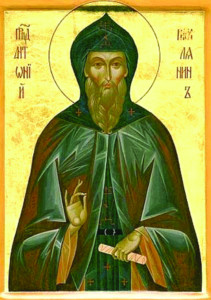“Its Effect is to Hold the World Together”
By Father El Meskeen
Orthodox Prayer, Part 3. Continuing Our Prayerful Examination of the Book Orthodox Prayer, by Matta El-meskeen, Coptic Monastic Reformer and Spiritual Father of the Monastery of St. Macarius, We Take a Look Now at the Conclusion of Chapter One, With Some Selected Inspiring Sayings of the Desert Fathers on the Nature of Prayer
…So every sentence of these sayings carries with it an experience or, rather, a part of the life of every saint. Therefore, you should pause at each of these sayings and consider the lives of these heroes — how they gained prayer for themselves as if it were everything. Their lives became prayer and their prayer became life. Compare your life with theirs and your experience with theirs. If your spirit burns within you, lay down this book, worship, and pray, and thus mingle your reading with prayer.
1. We ought to pray, neither according to any bodily habit nor with a habit of loud noise nor out of a custom of silence or on bended knees. But we ought soberly to have an attentive mind, waiting expectantly on God until he comes and visits the soul by means of all of its openings and its paths and senses. And so we should be silent when we ought and to pray with a cry, just as long as the mind is concentrated on God … so also the soul should be totally concentrated on asking and on a loving movement toward the Lord, not wandering and dispersed by its thoughts but with concentration wait expectantly for Christ. And thus he will enlighten, teaching one how to ask, giving pure prayer that is spiritual and worthy of God and bestowing the gift of worship “in spirit and in truth” (Jn 4.24)…. God who teaches us how truly to pray. In this way the Lord finds rest in the well-intended soul, making it a throne of glory and he sits on it and takes his rest. (St. Macarius the Great, Homilies 33.1, 2, in Maloney, Intoxicated with God: The Fifty Spiritual Homilies of Macarius)
2. Prayer is the lifting up of the mind to God. (St. John of Damascus, in Moore, “Some Aspects of Orthodox Prayer,” p i)
3. Prayer is by nature a dialog between man and God. It unites the soul with its Creator and reconciles the two. Its effect is to hold the world together. (St. John Climacus, Ladder of Divine Ascent 28.1, p 274)
 4. Now, my children, do not neglect to cry out day and night to God, entreating the bounty of the Father, and in his bounty he will give you help from heaven, teaching you until you know what is good… God will have pity upon him who follows these instructions, and will grant him that invisible fire which will consume all his impurity. His spirit will be purified; and then the Holy Spirit will dwell in him, and Jesus will abide with him, and so he will be able to worship God as he should. (St. Antony the Great, in Chitty, The Letters of St. Antony the Great 4, 5, pp. 12,14, 15)
4. Now, my children, do not neglect to cry out day and night to God, entreating the bounty of the Father, and in his bounty he will give you help from heaven, teaching you until you know what is good… God will have pity upon him who follows these instructions, and will grant him that invisible fire which will consume all his impurity. His spirit will be purified; and then the Holy Spirit will dwell in him, and Jesus will abide with him, and so he will be able to worship God as he should. (St. Antony the Great, in Chitty, The Letters of St. Antony the Great 4, 5, pp. 12,14, 15)
5. We must also know, beloved brethren, that every secret converse, every good care of the intellect directed toward God and every meditation upon spiritual things is delimited by prayer, is called by the name of prayer, and under its name is comprehended; whether you speak of various readings, or the cries of a mouth glorifying God, or sorrowing reflection on the Lord, or making bows with the body, or psalmody in verses, or all the other things from which the teaching of genuine prayer ensues. From genuine prayer the love of God is born, for love comes of prayer. (St. Isaac the Syrian, Homilies 63, in The Ascetical Homilies of Saint Isaac the Syrian, p 303)
6. Sometimes during a long-continued prayer only a few minutes are really pleasing to God, only a few moments constitute true prayer and true service to God. The chief thing in prayer is the nearness of the heart to God, as proved by the sweetness of God’s presence in the soul. (Fr. John of Kronstadt, in Moore, “Orthodox Prayer,” p. 3)






Facebook Comments